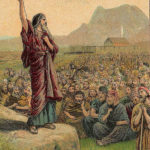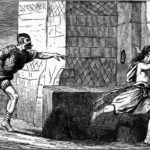Contradictions in the Bible is really a website devoted to textual criticism of the Bible, in particular to what scholars label as source-criticism, that is identifying the Bible’s different and often competing textual sources and assessing when they were written, by whom, to address what historical concerns, in relation to what other literary works, etc. Nearly all of the Bible’s contradictions, from minute narrative inconsistencies to larger theological and ideological agendasRead More
#350. After the conquering of Sihon and Og does Moses deliver his first speech OR does Moab hire Balaam, the Israelites commit apostasy at Baal Peor, Yahweh grants the priesthood to Phinehas, Moses and Eleazar take a second census, Yahweh gives laws for the sacrificial calendar, etc… (Deut 1:4-3:29 vs Num 22:1-36:13)
Deuteronomy’s Moses claims that he gives his first speech to the children of Israel, who are assembled before him on the plains of Moab, immediately after the conquest of the kingdoms of Sihon and Og. After he struck Sihon king of the Amorites who lived in Hesbon and Og king of Bashan who lived in Ashtaroth at Edrei on the opposite side of the Jordan in the land of Moab, MosesRead More
#349. Does the book of Deuteronomy contain “all the words” that Yahweh spoke to Moses across the Jordan OR not? (Deut 1:1-3 vs Ex 21-31, 34-40; all of Leviticus; Num 1-10, 15, 17:1-20:13, 28-31)

The book of Deuteronomy opens with this seemingly innocuous claim: These are the words which Moses spoke to all of Israel on the other side of the Jordan in the wilderness, in the plains before the Suph (sea), between Paran and Tophel and Laban and Hazeroth and Di-zahab (11 days from Horeb by way of mount Seir up to Kadesh-barnea). And it came to pass in the 40th year in theRead More
Introduction to Forthcoming Contradictions for Deuteronomy

We finally make it to the book of Deuteronomy—a book that in my view best exemplifies how later scribes, in this case the Deuteronomist, modified, rewrote, and even contradicted earlier tellings of Israel’s stories and traditions in an attempt to “up-date” these older traditions so that they better conformed with the religious and political views of their own historical circumstances. But don’t take my word on this matter. Rather, take theRead More
#348. A manslayer must remain in the city of refuge until he can stand trial OR until the current high priest dies? (Josh 20:6 vs Num 35:25)
This is the last entry for the book of Numbers. This contradiction continues the previous entries on the Torah’s variant asylum traditions (see Contradictions #345, #346, #347) and seems to be created by a spurious verse embedded in the Joshua passage. That is both the Priestly passage of Numbers 35 and the Priestly redactional work of Joshua 20 state that the murderer who murders another by mistake must remain in theRead More
#347. Does the murderer merely flee to a city of refuge OR must his case first be judged at the gate before admittance? (Deut 19:1-10 vs Num 35:9-18; Josh 20:1-6)
This entry follows the previous two entries (#345 & #346) on the Torah’s variant asylum traditions for murderers. It discusses, once again, a unique feature found only in the Deuteronomic tradition, or shall I say a unique silence or omission. No where does the Deuteronomic tradition (Deut 19:1-13) reference any legal proceedings associated with fleeing to, being admitted entrance in, and residing in a city of refuge. This version of theRead More
#346. Does Yahweh establish the cities of refuge for “every murderer” OR for only those who have killed another unintentionally? (Deut 19:4-12 vs Num 35:9-15; Josh 20:2-3)

Working from the previous entry (contradiction #345), the Torah, or Hexateuch to include the book of Joshua, speaks of the tradition of asylum in a number of different places. Arranged in roughly chronological order these are: Exodus 21:12-14 from the 9th-8th century Elohist tradition (see #345) Deuteronomy 4:41-43 & 19:1-13 from the 7th century Deuteronomic tradition Numbers 35: 9-28 from the 6th century Priestly tradition Joshua 20:1-9 which looks like aRead More